For Scouts and Guides
Winning the Victoria Cross
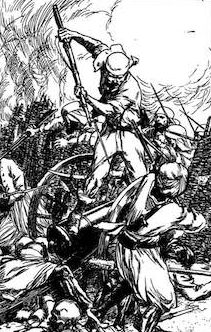
The Victoria Cross is the highest British decoration for bravery in battle. Kipling gives an account of its history, and describes the exploits of a number of winners of the Cross, from the Sepoy Rebellion of 1857 to the Great War of 1914-1918. (notes)
The Way that he Took
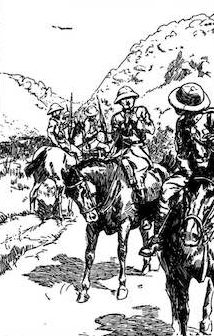
During the South African War, a small British force is out on the high Karroo plateau, stalked by a commando of Boer sharp-shooters. The commando lays a trap, feigning a retreat and hiding a strong body of riflemen in the hills to ambush the British.
The British send a scouting party out, led by a young Captain who sees the trap, and comes back to the main force along a circuitous route, avoiding the ambush. He reports, but his Colonel, who has little experience of this kind of warfare, reprimands him and rejects his intelligence. Things don’t look good for the British. (notes)
An Unqualified Pilot

Jim Trevor’s father is an experienced pilot, guiding ships up and down the Hugli, below Calcutta. Jim, aged fourteen, is desperate to become a pilot himself, and spends all his time on the water. His father wants him to become a clerk in an office.
One day the skipper of a Chinese junk, unwilling to pay the high charges for pilotage, asks Jim to take his craft down the river. He agrees, entirely illegally, and navigates the shoals by following his father, who is piloting another vessel. At the mouth of the river he is paid off in triumph, but is caught by his father. He gets a thrashing, but his father accepts the inevitable, and apprentices Jim to another pilot. He is on his way. (notes)
His Gift
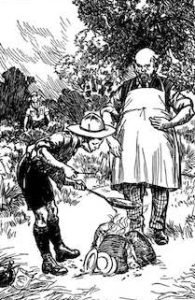
William is a hopeless Boy Scout, untidy, feckless, grubby, and no good at scouting. While the others are out on adventurous ploys, he is left in camp, doing menial tasks.
One day, the local baker, Mr Marsh, a skilled cook from Merchant Navy days, visits the camp, and does some cooking over the camp fire, producing a delicious meal. He shows an interest in William, who helps him, and they make friends. He notices that William is–as cooks should be—’Eavy in the run, oily in the skin, broad in the beam, short in the arm … light on the feet’. Cooking is his Gift. (notes)
A Flight of Fact
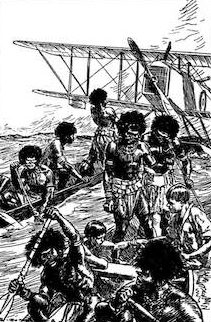
Two officers from the Royal Naval Air Service get separated from their mother ship in the ‘Pelungas’, an archipelago of coral atolls in the Indian Ocean. Their ‘plane, out of fuel, gets washed up on an island, and runs adrift.
After the initial shock the local islanders make friends with them, and help them to recover it. The airmen then spend several weeks with their rescuers. They have a convivial time in the best traditions of the Royal Navy until they are able to rejoin their ship, wearing massive beards, and the rainbow-coloured uniforms of the Pelunga army. (notes)
Stalky

How the General got his nickname. A group of schoolboys are planning a cattle raid against a local farmer. ‘Corkran’, with his two comrades Beetle and Turkey, thinks it’s bound to go wrong. They stay out of it, though they follow the raiders to see what will happen.
As predicted the raiders are caught and trapped in a barn awaiting punishment. Corkran finds a way of secretly getting them out. From then on he is called ‘Stalky’–an honourable title, meaning that he is uncommonly clever and wily. (notes)
The Burning of the Sarah Sands

The Sarah Sands was a troopship, carrying soldiers and their families from Britain out to India, via South Africa, in 1857. A devastating fire breaks out on board in the Indian Ocean. The families take to the boats, but the soldiers, by heroic efforts and ordered discipline, succeed in unloading the gunpowder and ammunition thay are carrying, and throwing it overboard. The fire dies down at last, leaving the after end of the ship in ruins (see above) but they re–embark the families and succeed in getting to Mauritus and safety. (notes)
The Parable of Boy Jones
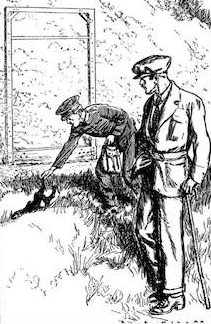
A few years before the Great War the Village Rifle Club is practising. All are keen, some very good.
The best shot that windy day is Milligan, a cripple. ‘Boy’ Jones, aged 22 and a good athlete in hard condition, has come with a friend to see the riflemen and boys at work. He knows nothing of shooting, and when he tries a shot makes a fool of himself. But he realises the value of learning, and a week later he is to be found in the miniature-rifle shed, taking tips from Milligan. (notes)
The Bold ‘Prentice

Young Ottley is an apprentice in the railway workshops, hoping to be an engine-driver one day. He makes friends with Olaf Swanson, a notable driver, who has written a manual–his ‘vademecome’–on how to repair damaged locomotives.
One night, in the rainy season, he is on his way to a rifle competition as a passenger, when one of the cylinders on the train’s locomotive blows up. Young Ottley, mustering the help of a squad of British soldiers, and remembering Olaf’s book, disconnects the wrecked cylinder and takes the train on across Bengal in the darkness. As the story ends he is taking out his first engine, as a driver. (notes)
The Son of his Father

Little Adam Strickland has been beaten by his father for some small offence, and is deeply affronted because it took place in the presence of a woman, his ayah. Like his father’s servants, whom he knows well, he is sensitive about his izzat , his honour.
To recover his self respect he must have revenge on his father, who is a policeman. There has been what seems to be a theft, and Strickland makes great efforts to find the gang of thieves. Adam has known all along that it was a false story, but he does not reveal this until his father has made a fool of himself. Adam’s honour is restored. (notes)
An English School
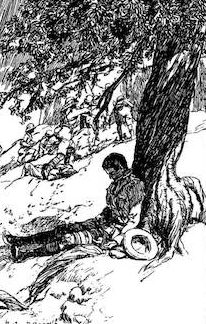
United Services College, the much-loved school which Kipling attended from 12 to 16, and wrote of in Stalky & Co.
Joyce Tompkins writes of those tales: ‘The boys that swarm through the page act and speak with complete credibility … The whole lively, grubby, community is there, with the masters irritated, supercilious, mutually intolerant, yet possessed by that unreasonable ‘caring’ of the teacher for the pupil as the recipient of his ministration … .’ (notes)
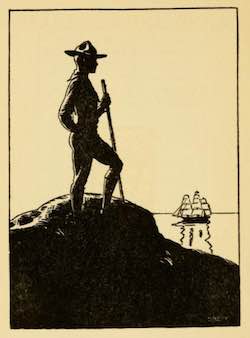
The other illustrations used here are by H. R. Millar (1869-1942) and are reproduced from a copy of the book (Macmillan) held by The Digital Library of India via the Internet Archive.
PREFACE to Land & Sea Tales
TO ALL to whom this little book may come—
Health for yourselves and those you hold most dear!
Content abroad, and happiness at home,
And—one grand secret in your private ear:—
Nations have passed away and left no traces,
And History gives the naked cause of it—
One single, simple reason in all cases;
They fell because their peoples were not fit.
Now, though your Body be mis-shapen, blind,
Lame, feverish, lacking substance, power or skill,
Certain it is that men can school the Mind
To school the sickliest Body to her will—
As many have done, whose glory blazes still
Like mighty flames in meanest lanterns lit:
Wherefore, we pray the crippled, weak and ill—
Be fit—be fit! In mind at first be fit!
And, though your Spirit seem uncouth or small,
Stubborn as clay or shifting as the sand,
Strengthen the Body, and the Body shall
Strengthen the Spirit till she take command;
As a bold rider brings his horse in hand
At the tall fence, with voice and heel and bit,
And leaps while all the field are at a stand.
Be fit—be fit! In body next be fit!
Nothing on earth—no Arts, no Gifts, nor Graces—
No Fame, no Wealth—outweighs the want of it.
This is the Law which every law embraces—
Be fit—be fit! In mind and body befit!

Just So Stories · The Jungle Book · Puck of Pook’s Hill · Rewards and Fairies · Stalky & Co. · Land and Sea Tales